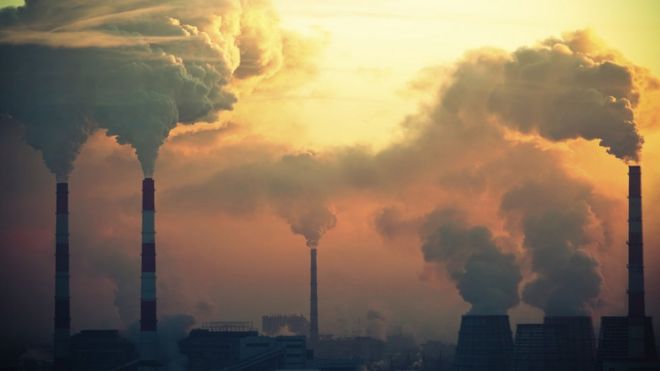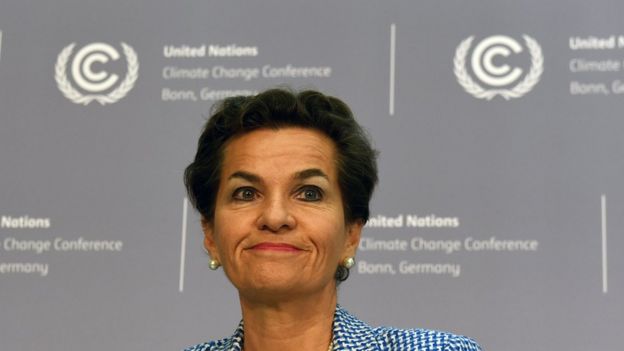
The UN has released its assessment of national plans to limit climate change, submitted by 146 countries.
Officials say the submissions, in their current form, won't keep global temperatures from rising by more than the 2C danger threshold.
The global total of carbon emissions will continue to grow, although more slowly than over the past two decades.
However the UN report says the plans are a major step forward and the 2C goal is still "within reach".
The UN believes that these national climate plans, called Intended Nationally Determined Contributions (INDCs) will form the cornerstone of a binding, global treaty on climate change that will be agreed at a conference in Paris in December.
According to the UN, the submissions now cover around 86% of global emissions: about four times the amount covered by the Kyoto Protocol, the world's first carbon cutting treaty.
Their assessment is decidedly upbeat about the plans, despite acknowledging that taken together they point to rises in global temperatures of 2.7C above the pre-industrial level.
Scientists have determined that if temperature rises exceed 2C, this will lead to significant and dangerous climate impacts, which will especially hit the world's poor.
UN climate chief, Christiana Figueres, said the plans were an excellent first step: "The INDCs have the capability of limiting the forecast temperature rise to around 2.7C by 2100, by no means enough but a lot lower than the estimated four, five, or more degrees of warming projected by many prior to the INDCs."
Observers say the 2.7C figure is a substantial improvement on 3.1C, which was the estimate when the plans were assessed last December.
UN climate conference 30 Nov - 11 Dec 2015

COP 21 - the 21st session of the Conference of the Parties - will see more than 190 nations gather in Paris to discuss a possible new global agreement on climate change, aimed at reducing greenhouse gas emissions to avoid the threat of dangerous warming due to human activities.
Explained: What is climate change?
In video: Why does the Paris conference matter?
Analysis: Latest from BBC environment correspondent Matt McGrath
More: BBC News climate change special report
A key finding of the UN reports is that the INDCs will bring down per capita emissions by 9% by 2030.
But while the rate of growth in CO2 may be declining, the overall amount of carbon in the atmosphere will continue to grow significantly over the next 15 years.
Compared to 2010 levels, the UN says that overall emissions could be up to 22% higher in 2030. The assessment says that, as they stand, the plans won't achieve the goal of peaking global emissions and then reducing them rapidly.
Another concern is that 25% of the total range of emissions reductions are conditional upon financial support from richer countries.
Despite these issues, the fact that so many countries, rich and poor, have submitted plans to cut carbon is giving environmental campaigners great hope that a new deal is imminent.
"The vast majority of the INDCs this time around, 105 of them, contain concrete greenhouse gas mitigation targets. That's in contrast to 27 for Copenhagen," said Taryn Fransen from the World Resources Institute, referring to the failed conference in the Danish capital in 2009.
"You have quite a few more countries that are now specifying absolute decreases in emissions levels. You have countries like China, South Africa and Singapore talking about peaking emissions through a hard cap.
"Even much smaller countries like Ethiopia, Bhutan and Costa Rica are identifying absolute limits on the quantity of emissions. I think that signals a real evolution."
The challenge for the UN is now to take these intentions and turn them into a coherent and legally binding deal when heads of government and negotiators meet in Paris in a month.
Analysis: David Shukman - BBC Science Editor
 Getty Images
Getty Images
An "unprecedented engagement", says Christiana Figueres, the head of the UN's climate change negotiations. And if one thinks back to the irritable, dysfunctional days of the Copenhagen summit in 2009, the last big push for an international response to global warming, there has been a remarkable turnaround.
In the aftermath of that failed gathering, it seemed almost inconceivable that within a matter of years new momentum would be returned to what has generally been a faltering process.
It's worth bearing in mind that the national pledges to take action are of course entirely voluntary.
When the idea of individual submissions was first agreed, it was perfectly possible that many, if not most, of the world's 196 countries would choose to turn a blind eye, or plead some other pressing distraction, or argue that cutting greenhouse gases is a task to be faced by others.
Instead, an impressive 86% of global emissions are covered if you add up the total of all the different pledges.
Will it ultimately make any difference?
The numbers don't add up to what the scientists say is needed to avoid the worst of global warming. Emissions will still keep rising, albeit at a slower pace.
And the promises are just that - promises. Who knows how many governments will turn them into law and take them seriously? How many will refuse to act until the right finance is offered?
The outcome of all this is uncertain and much depends on the exact deal thrashed out at the approaching summit in Paris.
Copenhagen may well haunt the talks. But compared to where this process stood six years ago, there's a world of difference.
Even though the plans don't add up to enough of a cut to avoid a 2C rise, campaigners believe that a strong review mechanism can - and must - be put in place by the Paris agreement.
"Paris will not be the end of the world's efforts to tackle climate change, but it might be the end of the beginning," said Mohammed Adow from Christian Aid.
"Going forward we will need a five-year review mechanism that will track how countries are doing and push them to do more as technology advances and more finance becomes available."
Getting all that into a Paris deal won't be easy. In fact the emissions pledges are the most straightforward aspect.
In fact, the negotiators now have a draft document that runs to 50 dense pages.
In the words of one delegate at a recent negotiating session, even the world's best paid lawyer would be hard pressed to understand it.
No comments:
Post a Comment